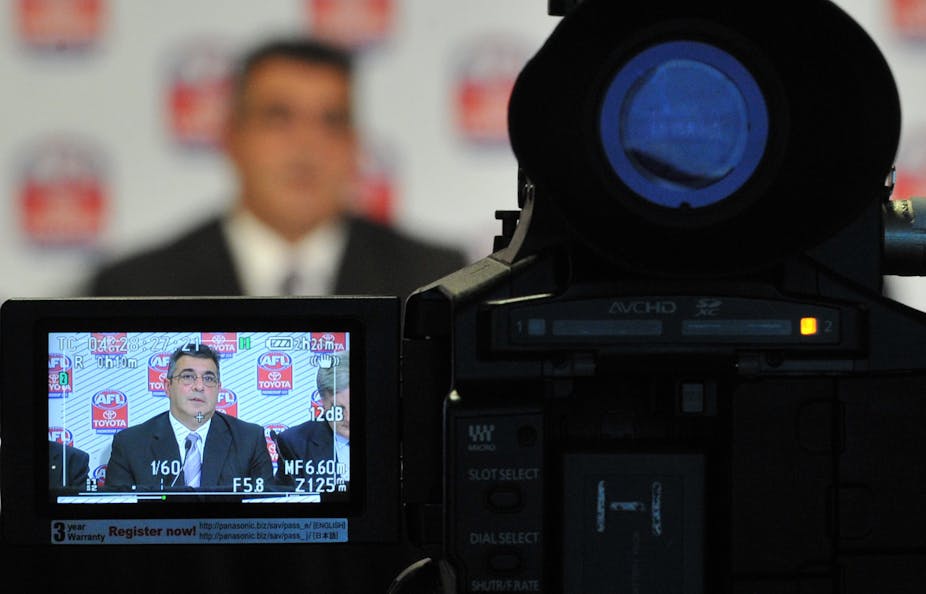Almost 15 years have passed since Rupert Murdoch declared that “sport absolutely overpowers film and everything else in the entertainment genre,” yet the media mogul’s words still capture the reality of the contemporary media marketplace.
Sport sits at the apex of valuable content forms for broadcasters, media companies, and increasingly telecommunications carriers.
The wonky moral compass of Murdoch’s British tabloid newspapers is in drastic need of repair. Yet, in the eye of the storm, ballast for his global media empire is supplied by extensive men’s sports coverage consumed on a daily basis by readers, viewers and Internet users.
A glance at News Ltd’s operations in Australia emphasises why sport is central to the generation of sizable profits in a convergent media environment.
The three Fox Sports channels are a key driver of subscribers for Foxtel’s pay television offerings. National Rugby League (NRL) and Australian Football League (AFL) games are consistently among the highest rating programs on Fox Sports. The NRL is, at least for the moment, half-owned by News Ltd.
Two of this country’s highest selling newspapers, The Herald-Sun and The Daily Telegraph, exist as much to provide exhaustive football and cricket coverage as any other form of news.
Measured across multiple metrics, the Fox Sports website, foxsports.com.au, is the most popular of its type in Australia. News also owns a minority share in emerging online companies such as SportingPulse International, a growing operation that reportedly services 3,000 sports leagues and 20,000 clubs in multiple countries.
Sport attracts reliable, mass attention at a time when audiences are fragmenting across different platforms and technologies.
The vice-chairman of FOX Sports Media Group in the United States, Ed Goren, has indicated sport is the one remaining form of “must-see TV”. He speaks of sport as a staple for chat around the water cooler, even as delivery options and audience consumption habits diversify.
Top-level live sport has long been a perishable product. Its immense value is created by the focussed attention it attracts from large audiences, which is then sold to advertisers and sponsors. This attention and value dissipates once the result of a game or fixture is known.
The Internet, web and mobile platforms are offseting this perishability.
Channel Nine may sit outside the stable of News Ltd-owned companies, but a record average audience of close to 2.5 million viewers for the final State of Origin rugby league match of 2011 demonstrates why television still matters in the age of the Internet.
This level of appeal also explains why Foxtel paid an estimated $600 million to telecast every AFL game (with the exception of the grand final) from 2012 to 2016.
News Ltd is now working assiduously to capture as much lasting fan attention as possible once matches are over. This is achieved by supplying raw material for continuing chat around the physical and virtual water cooler.
Content is pumped out across multiple platforms in order to satisfy the hunger of fans and generate anticipation for the next set of games. Highlights, pre- and post-match analysis, weekly panel programs, daily reporting, statistical analysis and user discussion. All this content can be found on television, in print and on the web.
The growing use of live “lunchtime” online chats with famous athletes on the Fox Sports website is a mechanism to further monopolise the spare time of fans.
Online fantasy football and cricket leagues and tipping competitions are lucrative and popular, attracting the eyeballs of participants for lengthy periods of time. These leagues are discussed and promoted in the newspaper and during television coverage and weekly programming.
Facebook, Twitter and mobile apps deliver endless live score updates, sports news and highlights.
Broadcast meets broadband. This is the new ecology of sports media, one in which News Corporation possesses expertise and a ‘first mover’ market advantage as Internet speeds increase and broadband availability spreads. Murdoch’s present difficulties do not change the fact he understands a fundamental truth about the media market. Sport is power, now and into the future.

